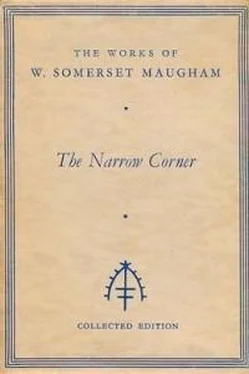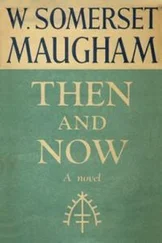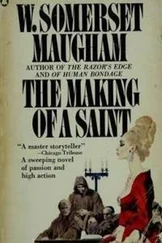“I forgot to give you the manuscripts last night that I promised to let you see, so I’ve brought them down.”
“That’s very kind of you.”
Frith untied the string and disclosed a small pile of typewritten sheets.
“Of course, I want an absolutely candid opinion.” He gave the doctor a doubtful look. “If you have nothing very much to do at the moment I might read you a few pages myself. I always think poetry should be read aloud and it’s only the author who can do justice to it.”
The doctor sighed. He was weak. He could think of no excuse that would turn Frith from his purpose.
“D’you think your daughter ought to wait in the sun?” he hazarded.
“Oh, she has things to do. She can go upon her errands and come back for me.”
“Would you like me to go with her, sir?” said Fred Blake. “I’ve got nothing to do.”
“I think she’d be very glad.”
He went down and spoke to Louise. The doctor saw her look at him gravely, then smile a little and say something. She was wearing this morning a dress of white cotton and a large straw hat of native make. Under it her face had a golden coolness. Fred swung himself up beside her and she drove off.
“I’d like to read you the third canto,” said Frith. “It has a lyrical quality that suits me. I think it’s about the best thing I’ve done. Do you know Portuguese?”
“No, I don’t.”
“That’s a pity. It’s almost a word–for–word translation. It would have amused you to see how closely I’ve managed to reproduce the rhythm and music, the feeling, in fact, everything that makes it a great poem. Of course you won’t hesitate to criticise, I’m only too willing to listen to anything you have to say, but I have no doubt in my own mind that this is the definitive translation. I can’t honestly believe that it will ever be superseded.”
He began to read. His voice had a pleasing quality. The poem was in ottava rima , and Frith laid an emphasis on the metre that was not ineffective. Dr. Saunders listened attentively. The version seemed fluent and easy, but he could not be sure how much this was due to the measured and stately elocution. Frith’s delivery was dramatic, but he put the drama into the sound, rather than the sense, so that the meaning of what he read tended to escape you. He stressed the rhyme so that it reminded Dr. Saunders of a slow train jogging over an ill–laid rail and his body felt a slight jolt as the expected sound at regular intervals fell upon his ear. He found his attention wandering. The rich, monotonous voice hammered on and he began to feel a little drowsy. He stared hard at the reader, but his eyes closed involuntarily; he opened them with a slight effort and frowned with the violence of his concentration. He gave a start, for his head fell suddenly towards his chest, and he realised that for a moment he had dozed. Frith read of gallant deeds and the great men that had made Portugal an empire. His voice rose when he read of high heroical things and trembled and fell when he read of death and untoward fate. Suddenly Dr. Saunders was conscious of silence. He opened his eyes. Frith was no longer there. Fred Blake was sitting in front of him, a roguish smile on his handsome face.
“Had a nice nap?”
“I haven’t been asleep.”
“You’ve been snoring your head off.”
“Where’s Frith?”
“He’s gone. We came back in the buggy and they’ve gone home to dinner. He said I wasn’t to disturb you.”
“I know what’s wrong with him now,” said the doctor. “He had a dream and it’s come true. What gives an ideal beauty is that it’s unattainable. The gods laugh when men get what they want.”
“I don’t know what you’re talking about,” said Fred. “You’re half asleep still.”
“Let’s have a glass of beer. That at all events is real.”
ROUND about ten o’clock that night the doctor and Captain Nichols were playing piquet in the sitting–room of the hotel. They had been driven indoors by the flying ants which the lamp on the verandah attracted. Erik Christessen came in.
“Where have you been all day?” asked the doctor.
“I had to visit a plantation we’ve got over at the other end of the island. I thought I’d be back earlier, but the manager’s just had a son and he was giving a feast. I had to stay for it.”
“Fred was looking for you. He wanted to go for a walk.”
“I wish I’d known. I’d have taken him with me.” He threw himself into a chair and called for beer. “I’ve had the best part of ten miles to walk and then we had to row back half–way round the island.”
“Like to play chouette ?” asked the skipper, giving him his sharp, foxy look.
“No, I’m tired. Where’s Fred?”
“Courtin’, I expect.”
“Not much chance of that here,” said Erik, good–naturedly.
“Don’t you be too sure. Good–lookin’ young fellow, you know. The girls fall for ’im. At Merauke I ’ad a rare job keepin’ ’em away from ’im. Between you and me and the gate–post I should ’ave said ’e clicked good and proper last night.”
“Who with?”
“That girl up there.”
“Louise?”
Erik smiled. The idea was quite preposterous to him.
“Well, I don’t know. She come and ’ad a look at the boat with ’im this mornin’. And I know ’e dolled ’imself up somethin’ fierce to–night. Shaved ’imself. Brushed ’is ’air. Put on a clean suit. I ask ’im what it was all about and ’e tell me to mind me own bloody business.”
“Frith was down here this morning,” said Dr. Saunders. “It may be he asked Fred to go and have supper there again to–night.”
“He ’ad supper on the Fenton ,” said Nichols.
He dealt the cards. The players went on with their game. Erik smoking a big Dutch cigar watched them and sipped his beer. Now and again the skipper gave him that sidelong glance of his in which there was something so unpleasant that it sent a shiver down your spine. His little close–set eyes glittered with malicious amusement. After a while Erik looked at his watch.
“I’ll go down to the Fenton . Maybe Fred’d like to come fishing with me to–morrow morning.”
“You won’t find ’im,” said the skipper.
“Why not? He wouldn’t be at Swan’s as late as this.”
“Don’t you be too sure.”
“They go to bed at ten and it’s past eleven now.”
“Maybe ’e’s gone to bed, too.”
“Rot.”
“Well, if you ask me I think that girl looked as though she knew a thing or two. It wouldn’t surprise me if they was comfortably tucked up together at this very minute. And very nice too. I wish I was in ’is place.”
Erik was standing up. With his great height he towered over the two men seated at the table. His face grew pale, and he clenched his fists. For a moment it looked as though he would hit the skipper. He gave an inarticulate cry of rage. The skipper looked up at him and grinned. Dr. Saunders could not but see that he was not in the least frightened. A blow from that great fist would certainly have knocked him out. He was a mean skunk, but he had pluck. The doctor saw with what a tremendous effort Erik controlled himself.
“It’s not a bad plan to judge others by oneself,” he said, his voice trembling, “but not if one’s a mangy cur.”
“’Ave I said anythin’ to offend you?” asked the skipper. “I didn’t know the lady was a friend of yours.”
Erik stared at him for a moment. His face showed the disgust he felt for the man, and his withering contempt. He turned on his heel and walked heavily out of the hotel.
“Wanting to commit suicide, skipper?” asked the doctor dryly.
Читать дальше
Конец ознакомительного отрывка
Купить книгу










